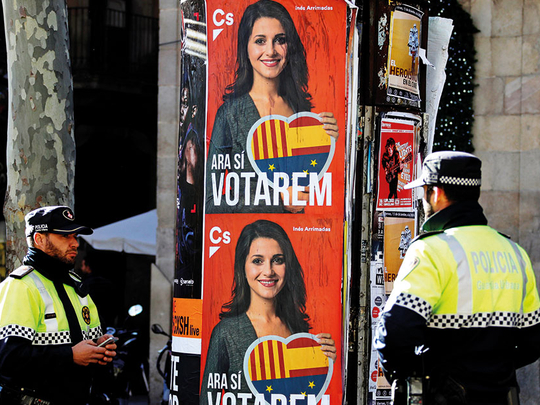
Brussels: The ousted leader of Catalonia recently addressed a rally of separatist voters in a packed theatre in the Catalan city of Igualada. He was not among his separatist supporters, but spoke via satellite from hundreds of miles away: in Belgium.
The long-distance campaign for re-election by the leader, Carles Puigdemont, highlights the unorthodox circumstances surrounding the Thursday’s Catalan elections. They were convened by Prime Minister Mariano Rajoy of Spain to defeat a secessionist drive by Puigdemont and other separatist officials and to return the restive region to what the Spanish leader called “normality.”
“These are absolutely abnormal conditions” for an election campaign, Puigdemont said in an interview in Brussels, the Belgian capital. “I consider it very difficult to take part now in any debate on an equal footing” with rival candidates.
Puigdemont surfaced in Brussels in October and is refusing to return to Spain to stand trial on charges of rebellion. Rajoy had ousted his administration and dissolved the Catalan Parliament, using emergency constitutional powers to stop separatist lawmakers who had unilaterally declared independence.
While Catalonia’s former leader says he was forced into exile to avoid an unfair political trial in Spain, his opponents say Puigdemont is a fugitive who is flouting Spain’s judiciary while pursuing an independence drive that violates the Constitution.
Rajoy is calling on Catalan voters to defeat Puigdemont and the other separatist politicians who have governed Catalonia since 2015 but have threatened to break up Spain by holding an illegal independence referendum on October 1.
The challenge for Rajoy is not only to defeat the separatist parties, but to ensure that his Popular Party maintains a presence in Catalonia.
After the coming vote, Rajoy said during a visit to Catalonia last week, “I would like a situation of normality and tranquillity.” The independence movement, he added, “has been the story of an enormous deceit.”
While Puigdemont is campaigning from Belgium, his former deputy and separatist rival, Oriol Junqueras, is running for office from a prison in Madrid, where he has been held while awaiting trial on charges of rebellion.
Another separatist party, the far-left Popular Unity Candidacy, is also competing even while denouncing the vote as illegitimate: It claims Rajoy abused his emergency powers by calling a new election in Catalonia.
Xavier Torrens, a professor of politics at the University of Barcelona, said it was the first time since Spain’s return to democracy, in the 1970s, that an election was being held in the absence of key party leaders. He said a judge’s decision to send Junqueras and others to jail, pending a trial, created “a situation of serious abnormality.”
He added, “I’m certainly not saying that Spain isn’t a democracy, but some important guarantees of democracy have now been infringed.”
Separatism has split Catalan society down the middle, with most opinion polls showing that neither side will score a decisive win on Thursday, perhaps paving the way for a complicated round of negotiations to form a coalition government.
Still, Puigdemont wants to convince voters, he said, that “if the unionists win, Rajoy wins.”
Opinion polls show Rajoy’s Popular Party heading for a major defeat even as another anti-independence party, Ciudadanos, is expected to make major gains.
The separatist leaders’ campaigns from unorthodox locations while facing prosecution are not the only unusual factors about the election. Catalans are being asked to take part in a parliamentary election in which almost nothing has been discussed except secessionism.
— New York Times News Service











